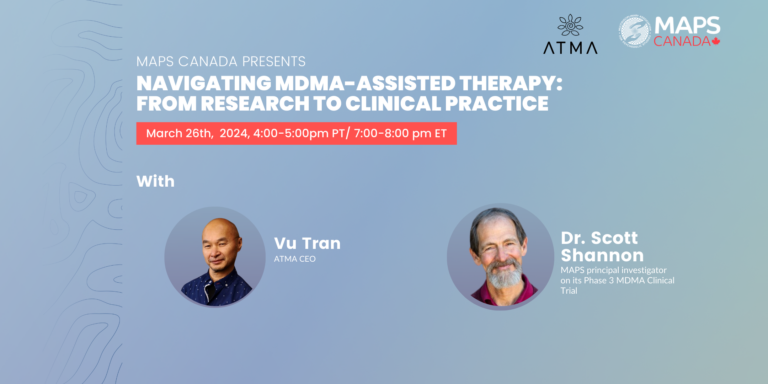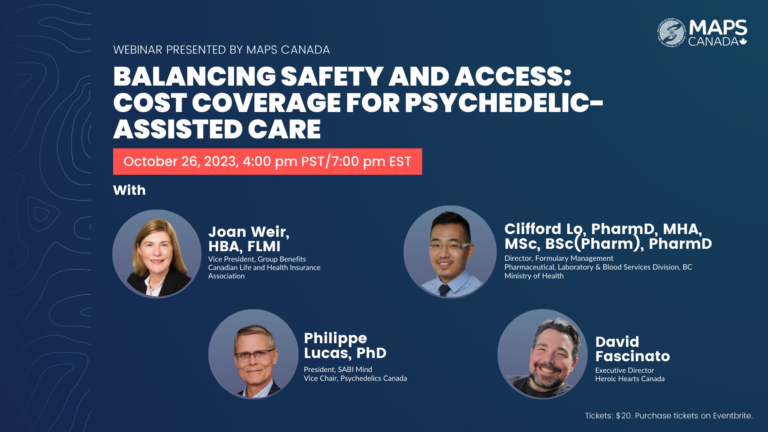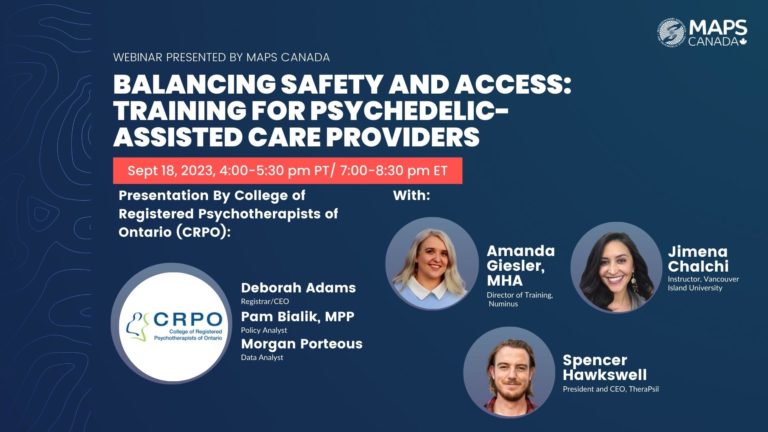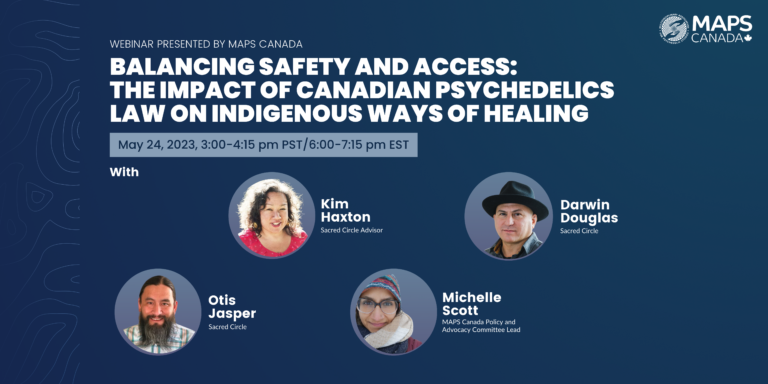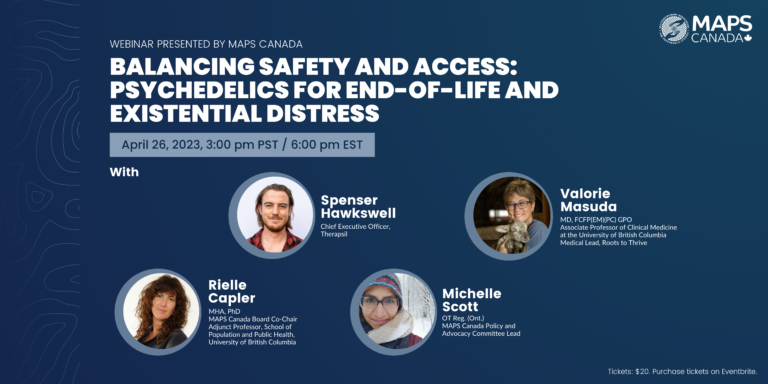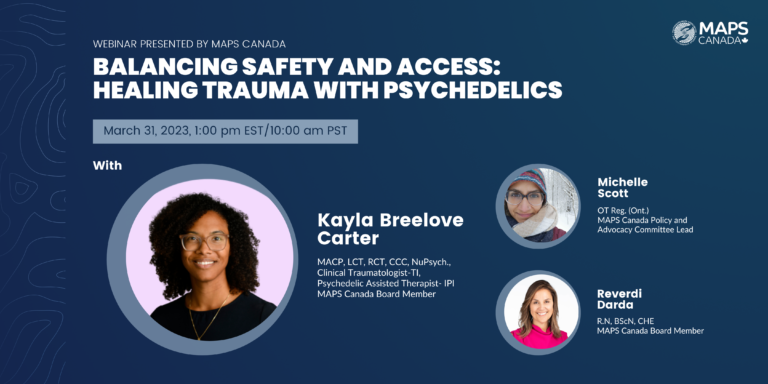MAPS Canada regularly hosts webinars featuring leading experts from around the world. Find out more about our upcoming webinars or watch past webinars!
MAPS CANADA UPCOMING WEBINARS
MAPS Canada presents:
Navigating MDMA-Assisted Therapy: From Research to Clinical Practice
March 26th, 4pm PST, 5pm CST, 7pm EST
Join Dr. Scott Shannon (MAPS principal investigator on its Phase 3 MDMA Clinical Trial), and ATMA CEO, Vu Tran to learn more about In-Person MDMA-Assisted Therapy Training, based on MAPS protocols, coming to Calgary in May 2024 as well as ATMA-CENA plans for expanding clinic infrastructure in Canada. With priority review in the US by the FDA and the expected priority review in Canada initiated by Lykos, there is an urgency for both training and clinics to be ready for legalization.
The FDA recently granted Lykos Therapeutics (formerly MAPS PBC) a priority review on their New Drug Application (NDA) for MDMA, allowing for a shorter review period of 6 months vs the 10 months conventional review period. The FDA could grant Lykos MDMA approval for therapy as early as August 2024. The rescheduling MDMA could be another 3 months from FDA approval but it’s likely MDMA-assisted therapy (MaT) will be available to some individuals before the end of 2024. Training and clinic infrastructure to provide MDMA-assisted therapy is quickly becoming the priority to focus on to make this treatment accessible in both the US and Canada.
The expectation is that Lykos will take a similar path of requesting a priority review to Health Canada for a New Drug Submission (NDS) upon approval from the FDA. Although legalization for MaT in Canada will be behind the US, we could likely see Health Canada approval early to mid 2025.
Join Reverdi Darda, MAPS Canada Board member, in discussion with Dr. Shannon and Vu Tran as we discuss these exciting and rapidly-unfolding developments in psychedelic assisted therapy in Canada.
*Recording will be available for 30 days after the event for the same email address that was used to register
Learning Objectives
- Learn about the specifics of MDMA-Assisted Therapy Training utilizing the MAPS Protocol
- Learn about how clinics prepare for MDMA-Assisted Therapy
- Hear practitioners’ perspectives on what the path towards legal MDMA-assisted therapy may look like in Canada
- Hear practitioners’ perspectives on how the rollout of MDMA-assisted Therapy may look in Canada
Dr. Scott Shannon, (MAPS principal investigator on its Phase 3 MDMA Clinical Trial)
Scott has been a student of consciousness since his honor’s thesis on that topic at the University of Arizona in the 1970s. Following medical school, MDMA assisted psychotherapy became a facet of his practice before this medicine was scheduled in 1985. He then completed a psychiatry residency at a Columbia program in New York. Scott studied cross-cultural psychiatry and completed a child/adolescent psychiatry fellowship at the University of New Mexico. Scott has published four books on holistic and integrative mental health including the first textbook for this field in 2001. He founded Wholeness Center, the largest integrative mental health center in the US, in 2010 with a group of aligned professionals to create innovation in collaborative mental health care.
Scott is a past president of two national medical organizations. He serves as a site Principal Investigator and therapist for the Phase III trial of MDMA assisted psychotherapy for PTSD and for the Phase IIB trial of LSD for generalized anxiety disorder. He has also published numerous articles about his research on cannabidiol (CBD) in mental health. Scott co-founded the Psychedelic Research and Training Institute (PRATI) to train professionals in ketamine-assisted psychotherapy and deliver clinically relevant studies. Scott helped to initiate the Board of Psychedelic Medicine and Therapies in 2021. He lectures all over the world to professional groups interested in a paradigm shifting perspective about transformative care.
Vu Tran, ATMA CEO
Vu is a student of plant medicine, has his yoga instructor certification and also 20 years of experience as a strategic investor and successful entrepreneur. He believes in pursuing a balanced life of business ambition with life giving work, that which nourishes the human spirit.
Vu is a life long entrepreneur and has founded, scaled and exited multiple ventures in a variety of markets including real estate, land development, hospitality, entertainment, retail and cannabis. Whether owned, led or partnered with, he has created a combined enterprise value of over $60M from all his ventures to date. As a result of his own experience and work, Vu is deeply involved with and passionate about what psychedelic medicine can bring to Canadians suffering with mental health issues.
BALANCING SAFTEY & ACCESS WEBINAR SERIES
MAPS Canada presents:
Cost Coverage for Psychedelic-Assisted Care
Thur Oct 26, 4:00-5:00 pm PT/7:00-8:00 pm ET
Cost coverage and affordability greatly impact patient access to psychedelic medicines and therapies. Legal access to psychedelics in Canada is only available through Clinical Trials and the Special Access Program (SAP). Ketamine is a legal psychedelic medicine and treatment is available, however, as with other psychedelic therapies, costs are high and are often not covered, making it out of reach for many patients in need.
Costs associated with legal psychedelic-assisted therapy include the cost of psychedelic medicine itself and costs associated with care personnel, which can include medical professionals and other regulated or unregulated health professionals. Treatments can involve several sessions over a period of weeks or months.
Similar costs are associated with underground psychedelic-assisted care and healing as well. Some people may opt to use psychedelics without support or therapy because these are not affordable, and cost-coverage is of course not available for illegal product and services.
Costs for other legal medicines are covered in certain contexts, including treatments for substance use disorders and for medical assistance in dying (MAID) by government and third party insurers. However, costs are not often covered for psychedelic-assisted care.
What is the state of cost coverage for psychedelic-assisted care in Canada? What is the route towards provincial cost coverage? What arguments could be made to third party insurers to include cost coverage in their policies? Which products and services should be covered? What is the impact on patients having to pay out of pocket? What are the implications of not being able to afford access to treatment?
*Recording will be available for 30 days after the event for the same email address that was used to register
Learning objectives
- Learn about different types of training currently available for psychedelic-assisted care in Canada for prescribers of psychedelic substances and care providers who offer holistic support during psychedelic-assisted therapy sessions.
- Learn how regulations, standards of care, professional colleges, associations and training programs interact in the current regulatory landscape.
- Examine how regulations and standards of care, either already existing or forthcoming, may influence and shape the training programs offered in the field of psychedelic-assisted care.
- Consider Indigenous ways of learning from various ancestral and cultural traditions related to these healing modalities and where and whether they are compatible within this context.
- Consider, from different perspectives, how training context (e.g. training courses vs lineage/mentorship-based) can impact safety and access to psychedelic assisted care and what elements are most important to achieve a good balance.
Presentation by :
College of Registered Psychotherapists of Ontario (CRPO)
Deborah Adams – Registrar/CEO
Pam Bialik, MPP – Policy Analyst
Morgan Porteous – Data Analyst
With:
Amanda Giesler, MHA
Director of Training, Numinus
Jimena Chalchi
Instructor, Vancouver Island University
Spencer Hawkswell
President and CEO, TheraPsil
MAPS Canada presents:
Training for Psychedelic-Assisted Care Providers
Mon Sept 18, 4:00-5:30 pm PT/ 7:00-8:30 pm ET
As psychedelic-assisted psychotherapy becomes more sought after by patients, there is a growing need for training in providing psychedelic-assisted care. Various organizations, from universities to private companies, are offering different kinds of training programs. Not all training programs are accredited, entry requirements and content vary, and few regulatory guidelines exist to inform their content.
Furthermore, there are many individuals and groups that have experiential, cultural and ancestral knowledge concerning these healing modalities, and these views and competencies are not always represented or recognized in training programs.
As psychedelic-assisted care becomes regulated, it is expected that training requirements will be articulated. These requirements will impact safety and access for patients depending on who will be included in training programs and what that training entails.
What should comprehensive training for providing psychedelic-assisted care entail? Who should be qualified to offer this type of training? Who should be eligible to access training? How should clinical credentials be weighted, compared to lineage and experience? Should training for prescribing look different than training for providing care? What training requirements are safest for patients? What training models provide access to the best care?
Join MAPS Canada as we engage in conversation with stakeholders in the field for a discussion about this topic.
*Recording will be available for 30 days after the event for the same email address that was used to register
Learning Objectives
- Learn about different types of training currently available for psychedelic-assisted care in Canada for prescribers of psychedelic substances and care providers who offer holistic support during psychedelic-assisted therapy sessions.
- Learn how regulations, standards of care, professional colleges, associations and training programs interact in the current regulatory landscape.
- Examine how regulations and standards of care, either already existing or forthcoming, may influence and shape the training programs offered in the field of psychedelic-assisted care.
- Consider Indigenous ways of learning from various ancestral and cultural traditions related to these healing modalities and where and whether they are compatible within this context.
- Consider, from different perspectives, how training context (e.g. training courses vs lineage/mentorship-based) can impact safety and access to psychedelic assisted care and what elements are most important to achieve a good balance.
Presentation by
College of Registered Psychotherapists of Ontario (CRPO)
Deborah Adams – Registrar/CEO
Pam Bialik, MPP – Policy Analyst
Morgan Porteous – Data Analyst
With:
Amanda Giesler, MHA
Director of Training, Numinus
Jimena Chalchi
Instructor, Vancouver Island University
Spencer Hawkswell
President and CEO, TheraPsil
MAPS Canada presents:
The Impact of Canadian Psychedelics Law on Indigenous Ways of Healing
Wed, May 24, 2023 3:00 PM - 4:15 PM PDT
Welcome to the third installment in our webinar series Balancing Safety and Access in Regulations for Psychedelics, where we explore this complex issue in various contexts and from different perspectives.
The use of psychedelic plants for ceremony and healing is a tradition that is thousands of years old and has its roots in Indigenous communities all over the globe. As such, it is essential that models of psychedelic healing have a deep understanding and respect for Indigenous healing practices and ways of knowing.
The government of Canada states that it “recognizes that all relations with Indigenous peoples need to be based on the recognition and implementation of their right to self-determination, including the inherent right of self-government.” The right of Indigenous peoples to use traditional and plant medicines for ceremonial and sacred use is also recognized.
As nations, including Canada, are moving forward with regulating psychedelics, medical models are being proposed with respect to psychedelic treatment for mental health.
What is the potential impact of these regulatory models on Indigenous approaches to healing? How can Canada’s federal and provincial governments learn from and respect Indigenous communities in this changing regulatory landscape?
Join MAPS Canada as we discuss these topics with Indigenous leaders, healers, and activists from Sacred Circle, an Indigenous health and wellness organization offering transformational healing programs for all, based on traditional Indigenous, holistic and modern health practices.
May be eligible for CE credits.
*Recording will be available for 30 days after the event for the same email address that was used to register
Learning Objectives
- Learn about how Sacred Circle approaches an Indigenous model of care with respect to psychedelic healing
- Learn how Canadian laws, regulations and policies can impact safety and access in Indigenous community
- Learn
about how the Nation of Canada and policy makers can respectfully
engage in consultation with Indigenous communities around policy changes - Learn about how more collaborative/community care models can
inspire new ways of approaching psychedelic healing in the changing
landscape of psychedelics in the Nation of Canada - Learn how the
psychedelic community can support Indigenous ways of healing, as an
ally, so Indigenous communities can strengthen their connection to the
land, and center traditional healing practices for increased health and
wellness.
Presentation by :
Kim Haxton, Sacred Circle Advisor
 Kim Haxton is Potowatomi from the Wasauksing First Nation in Ontario, and has worked across Turtle Island and abroad in various capacities, always emphasizing local leadership development.
Kim Haxton is Potowatomi from the Wasauksing First Nation in Ontario, and has worked across Turtle Island and abroad in various capacities, always emphasizing local leadership development.
Her deep understanding of the need for genuine restoration has far-reaching implications as leaders seek vision, and all people seek direction to address the mounting pressure of a system incongruous with the values of the natural world. Respect. Responsibility. Reciprocity. Equity.
She is in high demand with corporations, non-profit organizations and individual leaders who have come to trust her vision, wisdom and guidance. She provides one-on-one leadership coaching, creates and delivers workshops, and delivers keynote addresses for her corporate clients and others.
Her work is founded in land-based education and leadership; she has developed and facilitated programs in as many as ten countries and even more cultures. Kim works with Indigenous communities toward decolonization and liberation, and with groups interested in understanding Reconciliation.
Darwin Douglas, Sacred Circle
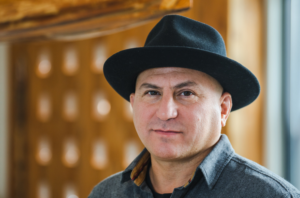
Darwin is responsible for strategic oversight, management and operation of All Nations, a leading Indigenous cannabis company. He is also co-founder of Sacred Circle, an Indigenous health and wellness organization, integrating plant medicine and Indigenous ways of healing. As former, long-standing council member for the Cheam First Nation and director of Cheam Enterprises Inc., Darwin is well-versed in First Nation’s politics, business development and strives to assist Indigenous Nations achieve economic independence.
Darwin is a leader in both his family and community. Throughout his life, his work has been driven by the legacy of his late Grandfather Chief Albert Douglas, a genuine leader who had a vision of wellness and prosperity for the Stó:lō people. The second oldest of seven siblings, Darwin is proud to have a strong entrepreneurial spirit that was passed down from grandparents, and follows in the leadership path his family created.
Darwin was a key player in assisting the Shxwhá:y First Nation to develop, build and licence a 30,000 square foot cannabis cultivation and processing facility on reserve land. This state-of-the-art facility will produce upwards of 4,000 kgs of premium cannabis products per annum which can be sold in national and international markets.
Darwin has a deep knowledge of Indigenous issues. He served as a researcher and manager in Aboriginal Rights and Title for both the Cheam First Nation and the Stó:lō Nation for several years. He also managed the Coqualeetza Cultural Education Centre, where he brought financial stability to the Centre and relocate archival materials to ensure they were preserved properly for future generations. Darwin owns two small businesses in the Fraser Valley: the Cheam Trading Post, which offers wild, local and fairtrade salmon and seafood products; and the Stó:lo Seafood Company, a business that operates a certified seafood processing facility.
Darwin has been a longstanding protector of Indigenous cultural knowledge and resources within his traditional territory for over 22 years. He holds a certificate in Cultural Resource Management from the University of Victoria.
Otis Jasper, Sacred Circle
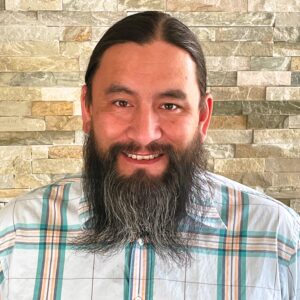
Otis is Sto:lo from Soowahlie and Cheam Nations, married into and currently living in Tkemlups te Secwepemc. The founder of Sacred Circle, the Director of Business Development and Partner Relations with All Nations, an Indigenous Cannabis Company, and a well-respected cultural leader with his family and community, Otis’ vision is the preservation of our cultural healing practices for future generations.
Otis served ten years as an elected leader and Chief for his home community of Soowahlie, has earned his Master’s of Business Administration from Simon Fraser University and upholds a strong cultural and ceremonial life for his family and children.
Michelle Scott, OT Reg. (Ont.) MAPS Canada Policy and Advocacy Committee Lead
 Michelle (she/her, aka Shel) Scott, is an occupational therapist working in mental health in Toronto Ontario. She also leads the Toronto-based Policy and Advocacy group for MAPS Canada and engages in Drug Policy research with MAPS Canada and Heroic Hearts Project Canada.
Michelle (she/her, aka Shel) Scott, is an occupational therapist working in mental health in Toronto Ontario. She also leads the Toronto-based Policy and Advocacy group for MAPS Canada and engages in Drug Policy research with MAPS Canada and Heroic Hearts Project Canada.
Her goal is to expand access to above-ground psychedelic medicines in a way that’s ethical, sustainable, and responsible. Her interests include mental health, cognitive science, philosophy, neuroscience, Indigenous ontologies and worldviews, meditative and contemplative practices, dialectics, and the intersection between science and spirituality.
MAPS Canada presents:
Psychedelics For End of Life & Existential Distress
Wed, Apr 26, 2023
Welcome to the second installment in our webinar series Balancing Safety and Access in Regulations for Psychedelics, where we explore this complex issue in various contexts and from different perspectives.
In this webinar, we will focus on the specific context of individuals facing end-of-life and/or existential distress due to mental health challenges.
We will be joined by Valorie Masuda, medical lead for Roots to Thrive, and Spencer Hawkswell, CEO and President of TheraPsil, who will share their knowledge and insights on the ethical, legal, and social implications of providing access to psychedelic therapy for these vulnerable populations. Our speakers will also discuss their current advocacy work and provide perspectives from providers who seek this type of treatment for their patients.
Joining us also is Rielle Capler, MAPS Canada Board Co-Chair, who will provide background on why this series is focused on Balancing Safety and Access, including our analysis and recommendations relating to Alberta’s recent regulations for psychedelic drug treatment services and the proposed expansion of the MAiD regulations to mental health conditions.
The discussion will be hosted by Michelle Scott, the lead of MAPS Canada’s Policy and Advocacy committee.
We invite you to join us for this important discussion, as we continue to work towards a better understanding of how to provide safe and accessible psychedelic therapy to those who need it most.
May be eligible for CE credits.
*Recording will be available for 30 days after the event for the same email address that was used to register
Learning Objectives
1. Discuss the impact of current regulations for psychedelics in Canada on the availability of Psychedelic Assisted Therapy (PAT) for individuals facing end-of-life distress and/or existential distress due to mental health challenges.
2. Learn about the urgent efforts made by advocates to increase access to psychedelics for mental health treatment in response to the proposed changes to Medical Assistance in Dying (MAiD) regarding mental illness.
3. Examine the perspectives of practitioners on balancing safety and access when providing PAT to individuals experiencing end-of-life distress and/or existential distress related to mental health challenges.
4. Learn about the ethical, legal, and social implications of providing timely access to PAT for individuals facing end-of-life distress and/or existential distress related to mental health challenges in Canada.
Presentation by
Valorie Masuda, MD, FCFP(EM)(PC) GPO Associate Professor of Clinical Medicine at the University of British Columbia Medical Lead, Roots to Thrive
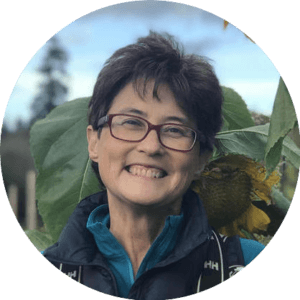 Valorie is a palliative care physician and general practitioner in oncology working in the Cowichan Valley on Vancouver Island. She is an Associate Professor of Clinical Medicine at the University of British Columbia and is working on a clinical trial demonstrating the feasibility of delivering psilocybin therapy in a group set, setting and integration model with Roots to Thrive (RTT). She is certified in psychedelic medicine through the California Institute of Integral Studies and has also received training through Therapsil and Roots to Thrive.
Valorie is a palliative care physician and general practitioner in oncology working in the Cowichan Valley on Vancouver Island. She is an Associate Professor of Clinical Medicine at the University of British Columbia and is working on a clinical trial demonstrating the feasibility of delivering psilocybin therapy in a group set, setting and integration model with Roots to Thrive (RTT). She is certified in psychedelic medicine through the California Institute of Integral Studies and has also received training through Therapsil and Roots to Thrive.
She has been working in the psychedelic space since 2020 using psilocybin-assisted therapy for palliative patients, navigating the Section 56 Exemption and later, the Special Access Program (SAP) through the RTT psilocybin assisted program, to support patients with distress secondary to their serious cancer diagnosis. RTT has treated 24 patients in groups and 4 patients individually with psilocybin. They have initiated a clinical trial to continue providing this service.
Spenser Hawkswell Chief Executive Officer, TheraPsil
 Spencer was first introduced to healing psychological trauma with altered states of consciousness and therapeutic psychedelics from reading the work of Terrence McKenna, Rick Strassman, and Carl Jung and believes that these methods need to be treated seriously by governments and institutions. Spencer believes that responsible drug policy requires effective organization and leadership and is dedicated to bringing together the experts and advocates, to facilitate change that results in increased access to compassionate care, harm reduction, and treatment options for those in need. Psilocybin-assisted psychotherapy is a reasonable treatment option for palliative patients in end-of-life distress and is where we need to begin.
Spencer was first introduced to healing psychological trauma with altered states of consciousness and therapeutic psychedelics from reading the work of Terrence McKenna, Rick Strassman, and Carl Jung and believes that these methods need to be treated seriously by governments and institutions. Spencer believes that responsible drug policy requires effective organization and leadership and is dedicated to bringing together the experts and advocates, to facilitate change that results in increased access to compassionate care, harm reduction, and treatment options for those in need. Psilocybin-assisted psychotherapy is a reasonable treatment option for palliative patients in end-of-life distress and is where we need to begin.
Rielle Capler, MHA, PhD MAPS Canada Board Co-Chair Adjunct Professor, School of Population and Public Health, University of British Columbia
 Rielle Capler brings to her role as co-chair of MAPS Canada over 20 years of experience in research, knowledge translation, service provision, standards development, and community organizing. Rielle received the Governor General of Canada’s Queen Elizabeth II Diamond Jubilee Medal acknowledging her contribution to Canadian society through her work with medical cannabis. Rielle held a Postdoctoral Research Fellowship at the British Columbia Center on Substance Use and is Adjunct Professor in the School of Population and Public Health, in the Faculty of Medicine at the University of British Columbia.
Rielle Capler brings to her role as co-chair of MAPS Canada over 20 years of experience in research, knowledge translation, service provision, standards development, and community organizing. Rielle received the Governor General of Canada’s Queen Elizabeth II Diamond Jubilee Medal acknowledging her contribution to Canadian society through her work with medical cannabis. Rielle held a Postdoctoral Research Fellowship at the British Columbia Center on Substance Use and is Adjunct Professor in the School of Population and Public Health, in the Faculty of Medicine at the University of British Columbia.
Rielle’s research relates predominantly to cannabis and psychedelics, with a focus on equitable access to health care, use of legal and illegal sources, harm reduction, and intergenerational trauma. Rielle’s policy and advocacy focus is on the inclusion of systemically marginalized voices and communities, the transition of illegal and stigmatized plant medicines and psychedelics to a legal context, equitable access and economic development. Rielle has advised municipal, provincial and federal governments, as well as internationally, and co-founded several long-standing non-profit organizations to represent cannabis patients, producers, and retailers. She has been on the board of MAPS Canada for 1 year.
Michelle Scott, OT Reg. (Ont.) MAPS Canada Policy and Advocacy Committee Lead
 Michelle (she/her, aka Shel) Scott, is an occupational therapist working in mental health in Toronto Ontario. She also leads the Toronto-based Policy and Advocacy group for MAPS Canada and engages in Drug Policy research with MAPS Canada and Heroic Hearts Project Canada.
Michelle (she/her, aka Shel) Scott, is an occupational therapist working in mental health in Toronto Ontario. She also leads the Toronto-based Policy and Advocacy group for MAPS Canada and engages in Drug Policy research with MAPS Canada and Heroic Hearts Project Canada.
Her goal is to expand access to above-ground psychedelic medicines in a way that’s ethical, sustainable, and responsible. Her interests include mental health, cognitive science, philosophy, neuroscience, Indigenous ontologies and worldviews, meditative and contemplative practices, dialectics, and the intersection between science and spirituality.
MAPS Canada presents:
Balancing Safety and Access: Healing Trauma with Psychedelics
Mar 31 2023
Regulations for legal access to psychedelics have recently begun to emerge in Canada. While it is important that regulations address safety, it’s also important that they support access for those in need.
Join MAPS Canada as we explore the issue of Balancing Safety and Access in Regulations for Psychedelics. In this webinar series, we will delve into different aspects of safety and access, and what safety and access mean as they pertain to psychedelic use for therapy and healing purposes from diverse perspectives.
On March 31st, we are joined by two of MAPS Canada board members. Reverdi Darda will review the process and outcomes our recent report, and provide an introduction to this new webinar series. Kayla Breelove Carter will join MAPS Canada’s Policy and Advocacy committee lead, Michelle Scott, in a discussion about balancing safety and access in relation to healing trauma with psychedelics.
This webinar will help participants:
1)Understand the recommendations provided by MAPS Canada to address the need to balance safety and access in Alberta’s new regulations for psychedelic drug treatment services;
2) Understand the role that psychedelics can play in healing trauma, including ancestral, racial, and historical traumas;
3) Understand practitioner perspectives on what safety looks like in this therapeutic context;
4) Understand practitioner perspectives on what accessibility looks like in this therapeutic context, with an emphasis on racial disparities in access; and
5) Understand potential areas of tension and/or confluence between concepts of accessibility and safety in this therapeutic context, with an emphasis on trauma- and racially-informed practice and lens.
A recording of the webinar will be available for those who sign up
Presentation by
Kayla Breelove Carter – MACP, LCT, RCT, CCC, NuPsych., Clinical Traumatologist-TI, Psychedelic Assisted Therapist- IPI
 Kayla Breelove Carter (MACP, LCT, RCT, CCC, NuPsych., Clinical Traumatologist-TI, Psychedelic Assisted Therapist- IPI) works with individuals and organizations to increase their awareness and understanding of trauma, racial trauma, and adverse childhood experiences. Kayla helps bring reflection and profound change in one’s recovery journey, while guiding organizations in the reflection of how their privilege and own lens, can play out within their role in the workplace.
Kayla Breelove Carter (MACP, LCT, RCT, CCC, NuPsych., Clinical Traumatologist-TI, Psychedelic Assisted Therapist- IPI) works with individuals and organizations to increase their awareness and understanding of trauma, racial trauma, and adverse childhood experiences. Kayla helps bring reflection and profound change in one’s recovery journey, while guiding organizations in the reflection of how their privilege and own lens, can play out within their role in the workplace.
With over ten years of clinical experience, Kayla specializes as well in nutritional psychology and psychedelic assisted therapy. As a clinical supervisor for those seeking licensing in New Brunswick and Nova Scotia, Kayla also dedicates her time in supporting graduate students through Breelove’s weekly free counselling clinic and community counselling program, where individuals seeking counselling therapy can engage in one on one mental health counselling for free.
When she is not providing counselling therapy or consultation work, Kayla enjoys contributing to CBC Morning Moncton and PEI, as their mental health columnist, while also spending time with her two children under five and partner of fifteen years.
Reverdi Darda, R.N., CEO of Cena Life Inc., MAPS Canada Board Member
 Reverdi Darda, RN, is the President and CEO of Cena Life Inc., an Alberta based mental health services company and is also a new member of the MAPS Canada Board of Directors. With over 30 years of experience as a Registered Nurse and executive leader, Reverdi has wide-ranging knowledge about healthcare operations, policy and program development, strategic planning, and community engagement. She understands the challenges that healthcare systems and their structures have in offering individuals and families consistent, reliable, client focused services. She is passionate about bringing evidence-based innovation forward to those in need.
Reverdi Darda, RN, is the President and CEO of Cena Life Inc., an Alberta based mental health services company and is also a new member of the MAPS Canada Board of Directors. With over 30 years of experience as a Registered Nurse and executive leader, Reverdi has wide-ranging knowledge about healthcare operations, policy and program development, strategic planning, and community engagement. She understands the challenges that healthcare systems and their structures have in offering individuals and families consistent, reliable, client focused services. She is passionate about bringing evidence-based innovation forward to those in need.
Reverdi is Metis and a direct descendant of Damase Carriere who fought against Canadian Colonialism beside Louis Riel in the heroic Metis North-West Resistance of 1885. Her passion to engage communities and work together for the equity and inclusion of all is reflective in her family’s legacy.
Reverdi has held executive and leadership roles within the public, government, and non-profit sectors. Her strategic, analytic, communication, and people skills along with her determination, good humor, and versatility have consistently been considered an integral part of her success in leadership roles. Reverdi creates safe spaces and builds trusting relationships with all levels of professionals, including within communities.
Michelle Scott, Policy and Advocacy Committee Lead, MAPS Canada
 Michelle (aka Shel) Scott (she/her) is an occupational therapist working in mental health in Toronto Ontario. She also leads the Toronto-based Policy and Advocacy group for MAPS Canada.
Michelle (aka Shel) Scott (she/her) is an occupational therapist working in mental health in Toronto Ontario. She also leads the Toronto-based Policy and Advocacy group for MAPS Canada.
Her goal is to expand access to above-ground psychedelic medicines in a way that’s ethical, sustainable, and responsible. Her interests include mental health, cognitive science, philosophy, neuroscience, Indigenous ontologies and worldviews, meditative and contemplative practices, dialectics, and the intersection between science and spirituality.
In her free time she can be found going to concerts, dancing, playing music (alone or with friends), spending time outdoors, reading science fiction, watching hockey, and enjoying amazing food.
MAPS Canada presents:
Emerging Regulatory Frameworks for Psychedelics in Canada: Impact on Access
December 1, 2022
Current Canadian drug legislation prohibits legal use of most psychedelic medicines (excluding ketamine). However, there are some ways to access legal psychedelic medicine currently, i.e., through Section 56 exemptions and the Special Access Program (SAP).
About this webinar:
- Examine and explain the current Canadian regulatory landscape as it pertains to psychedelics.
- Discuss the emerging changes in the regulatory landscape for psychedelic therapy in Canada.
- Provide insights on Indigenous sovereignty and relations between First Nations and the Nation of Canada in relation to healing practices.
- Discuss practitioner’s perspective of the changing regulatory landscape and its impact on ensuring safe and effective access to psychedelic medicines and treatments.
Changes in Canadian psychedelic drug policy are emerging in Alberta and other provinces. These new policies and regulations have the potential to set a precedent for the rest of Canada.
However, concerns have been noted with these proposed changes and their impact on access. Furthermore, Indigenous perspectives have often been left out of the landscape of drug policy and research.
Join MAPS Canada as we provide exposition on the current regulatory landscape and bring together practitioners in the field of psychedelic therapy and science to discuss their experiences with access under the current regulatory framework, as well as their hopes for and concerns with future regulations pertaining to psychedelic medicines and treatments.
If you want to connect with other prescribers and practitioners who are interested in using the SAP for accessing legal psychedelic therapy for clients and patients, please consider being a part of our SAP Community of practice. For more information, CLICK HERE.
Presentation by
Madison Nobbs, RN, Executive Director, Ketamin Assisted Therapy Association of Canada
 Madison Nobbs, RN is a Registered Nurse with 10 years of experience, specialized in health care delivery, operations and compliance including ketamine assisted therapy (KAT) and psychedelic assisted therapy via Health Canada’s Special Access Program.
Madison Nobbs, RN is a Registered Nurse with 10 years of experience, specialized in health care delivery, operations and compliance including ketamine assisted therapy (KAT) and psychedelic assisted therapy via Health Canada’s Special Access Program.
She is the manager of programming at Psy Integrated Health, a benefit corporation supporting independent health and wellness centers to develop capacity and innovate in the integrative and transformative health spaces. Madison is also the current Executive Director of the not-for-profit, the Ketamine Assisted Therapy Association (KATA) of Canada, an organization focused on accessibility to KAT.
Madison is a mentor to other nurses who want to work in the psychedelic field and believes that nurses have a major role to play in advocating for accessibility, in creating community, in health promotion and in empowering individuals.
Francine Douglas, Manager, Sacred Circle Wellness
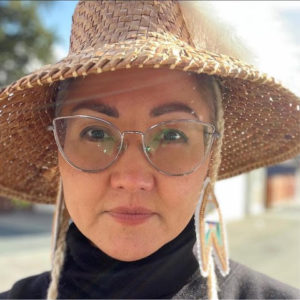 Francine Douglas, BA, is Stó:lō from Sts’ailes Nation and Tsimshian from Metlakatla Nation. Francine values and upholds her cultural teachings. Francine’s desire to support First Nation families and communities through the impacts of colonialism, assimilation and displacement has brought her to a diverse career in mental health, traditional medicine, business and cultural tourism.
Francine Douglas, BA, is Stó:lō from Sts’ailes Nation and Tsimshian from Metlakatla Nation. Francine values and upholds her cultural teachings. Francine’s desire to support First Nation families and communities through the impacts of colonialism, assimilation and displacement has brought her to a diverse career in mental health, traditional medicine, business and cultural tourism.
Francine currently works with the Thálé:ylexw awtxw Foundation, The House of the Life Givers, a grassroots Stó:lō womxn’s group with a purpose to support the growth and empowerment of Indigenous womxn in S’ólh Téméxw, the Stó:lō traditional territory.
Francine also works with Sacred Circle Wellness, supporting their vision for a healthcare system that honors Indigenous knowledge and ancestral traditional medicine. Francine considers her work with Sacred Circle Wellness one of the most powerful ways to support First Nations people in preserving their traditional knowledge, promoting cultural healing practices and reconnecting to their traditional territories.
Francine holds a Bachelor of Arts degree in psychology and anthropology from the University of British Columbia and was the valedictorian of the Ch’nook Indigenous Business Program from the Sauder School of Business.
Valorie Masuda, MD, Associate Professor of Clinical Medicine, University of British Columbia
 Valorie Masuda, MD, FCFP(EM)(PC) GPO, is a palliative care physician and general practitioner in oncology working in the Cowichan Valley on Vancouver Island. She is an Associate Professor of Clinical Medicine at the University of British Columbia and is working on a clinical trial demonstrating the feasibility of delivering psilocybin therapy in a group set, setting and integration model with Roots to Thrive (RTT). She is certified in psychedelic medicine through the California Institute of Integral Studies and has also received training through Therapsil and Roots to Thrive.
Valorie Masuda, MD, FCFP(EM)(PC) GPO, is a palliative care physician and general practitioner in oncology working in the Cowichan Valley on Vancouver Island. She is an Associate Professor of Clinical Medicine at the University of British Columbia and is working on a clinical trial demonstrating the feasibility of delivering psilocybin therapy in a group set, setting and integration model with Roots to Thrive (RTT). She is certified in psychedelic medicine through the California Institute of Integral Studies and has also received training through Therapsil and Roots to Thrive.
She has been working in the psychedelic space since 2020 using psilocybin-assisted therapy for palliative patients, navigating the Section 56 Exemption and later, the Special Access Program (SAP) through the RTT psilocybin assisted program, to support patients with distress secondary to their serious cancer diagnosis. RTT has treated 24 patients in groups and 4 patients individually with psilocybin. They are currently developing a clinical trial to continue providing this service as Health Canada has told RTT that they will not allow them to apply through SAP.
Reverdi Darda, R.N., CEO of Cena Life Inc., MAPS Canada Board Member
 Reverdi Darda, RN, is the President and CEO of Cena Life Inc., an Alberta based mental health services company and is also a new member of the MAPS Canada Board of Directors. With over 30 years of experience as a Registered Nurse and executive leader, Reverdi has wide-ranging knowledge about healthcare operations, policy and program development, strategic planning, and community engagement. She understands the challenges that healthcare systems and their structures have in offering individuals and families consistent, reliable, client focused services. She is passionate about bringing evidence-based innovation forward to those in need.
Reverdi Darda, RN, is the President and CEO of Cena Life Inc., an Alberta based mental health services company and is also a new member of the MAPS Canada Board of Directors. With over 30 years of experience as a Registered Nurse and executive leader, Reverdi has wide-ranging knowledge about healthcare operations, policy and program development, strategic planning, and community engagement. She understands the challenges that healthcare systems and their structures have in offering individuals and families consistent, reliable, client focused services. She is passionate about bringing evidence-based innovation forward to those in need.
Reverdi is Metis and a direct descendant of Damase Carriere who fought against Canadian Colonialism beside Louis Riel in the heroic Metis North-West Resistance of 1885. Her passion to engage communities and work together for the equity and inclusion of all is reflective in her family’s legacy.
Reverdi has held executive and leadership roles within the public, government, and non-profit sectors. Her strategic, analytic, communication, and people skills along with her determination, good humor, and versatility have consistently been considered an integral part of her success in leadership roles. Reverdi creates safe spaces and builds trusting relationships with all levels of professionals, including within communities.
Michelle Scott, Policy and Advocacy Committee Lead, MAPS Canada
 Michelle (aka Shel) Scott (she/her) is an occupational therapist working in mental health in Toronto Ontario. She also leads the Toronto-based Policy and Advocacy group for MAPS Canada.
Michelle (aka Shel) Scott (she/her) is an occupational therapist working in mental health in Toronto Ontario. She also leads the Toronto-based Policy and Advocacy group for MAPS Canada.
Her goal is to expand access to above-ground psychedelic medicines in a way that’s ethical, sustainable, and responsible. Her interests include mental health, cognitive science, philosophy, neuroscience, Indigenous ontologies and worldviews, meditative and contemplative practices, dialectics, and the intersection between science and spirituality.
In her free time she can be found going to concerts, dancing, playing music (alone or with friends), spending time outdoors, reading science fiction, watching hockey, and enjoying amazing food.
DRIVING CHANGE WEBINAR SERIES

MAPS Canada presents:
Episode 3:
Improving Access To Psychedelics As Medicine
June 22, 2022
Join MAPS Canada as we celebrate our partnership with the groundbreaking Roots To Thrive Community of Practice based in Nanaimo, BC, on and in partnership with the Coast Salish Territory of the Snuneymuxw First Nation and Vancouver Island University. We’ll discuss its innovative model and programs, and the results being reported by patients.
Working with stakeholders in Vancouver Island Health and Health Canada, Roots to Thrive provides multi-week, multidisciplinary mental healthcare programs (that include psilocybin-assisted and ketamine-assisted therapy sessions) for physician-referred patients experiencing a range of diagnoses (including PTSD, treatment-resistant depression, eating disorders, substance use disorder, OCD, end-of-life distress, and more) within an evidence-based, decolonized, and equity-informed community of practice (group therapy) model.
The Roots to Thrive team is led by regulated healthcare professionals who have been specifically trained in supporting and facilitating legal psychedelic therapy. Its multidisciplinary team includes over twenty experienced physicians, nurses, psychiatrists, registered clinical counselors, Indigenous knowledge keepers, somatic therapists, cultural and spiritual care practitioners, and trained facilitators.
We are delighted to welcome the founders of the Roots to Thrive Community of Practice and Dr. Lindsay Farrell, PhD, to discuss the on-the-ground impacts of Health Canada’s Special Access Program on patient access to care; why the Roots to Thrive model is both innovative and scalable; and the positive results patients report experiencing with Roots to Thrive’s programs.
 Shannon Dames
Shannon Dames
 Valorie Masuda
Valorie Masuda
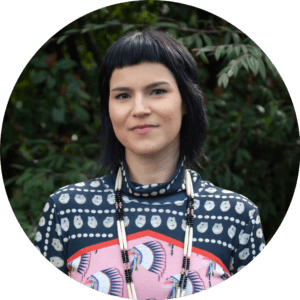 Lindsay Farrell
Lindsay Farrell
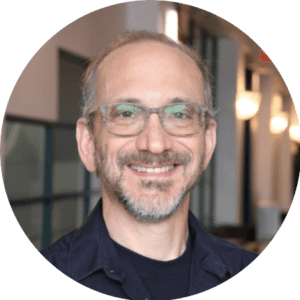 Scott Bernstein
Scott Bernstein
 Dr. Pamela Kryskow
Dr. Pamela Kryskow

MAPS Canada presents:
Episode 2:
Harm Reduction For People Who Use Psychedelics
May 18, 2022
MAPS Canada and guest speakers from the psychedelic harm reduction organization DanceSafe will explore the main principles of harm reduction and how to reduce the risks of using psychedelics. We’ll discuss the importance of checking unregulated substances for adulterants, and how to do so with a drug testing kit. We’ll also discuss how to talk with your friends and community about the importance of drug checking.
We will also explore the art of “trip sitting”: how to best support someone through a psychedelic experience by helping them maximize benefits, reduce harm, and practice integration of their experiences.
 Mitchell Gomez
Mitchell Gomez
 Erica Siegal
Erica Siegal
 Taylor Rodrigues
Taylor Rodrigues

MAPS Canada presents:
Episode 1:
Undoing the Harms of Drug Criminalization
April 20, 2022
For over a century, certain psychoactive drugs in Canada have been criminalized while others remain freely and legally available.
The so-called “War on Drugs” has cost vast amounts of public funds, imprisoned millions, and increased violence across the globe. It has led to a toxic and deadly illegal drug supply that has taken the lives of tens of thousands of Canadians.
MAPS Canada and our guests will discuss decriminalization, why it is important, and what decriminalization can–and cannot–do. We’ll take a critical look at decriminalization efforts in Canada and the US as a way to undo the harms of criminalization, and discuss what a world of decriminalized psychedelics might look like.
 Daniel Abrahamson
Daniel Abrahamson
 Michelle Scott
Michelle Scott
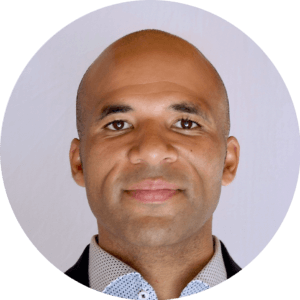 Akwasi Owusu-Bempah
Akwasi Owusu-Bempah
 Scott Bernstein
Scott Bernstein

